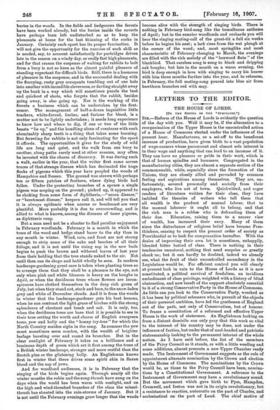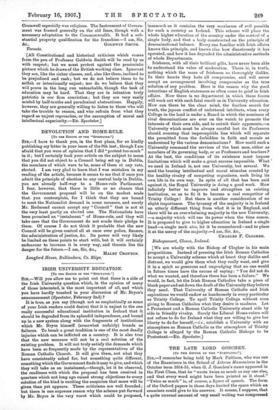LETTERS TO THE EDITOR.
THE HOUSE OF LORDS.
[TO 105 nOITOR Os TIM .SPILOPATOIL1 SIR,—Reform of the House of Lords is evidently the question of the day with you. Well it may be, if the alternative to a reorganisation of the Upper House is the uncontrolled action of a House of Commons elected under the influences of the present hour. Manufactures, as a set-off to the beneficent increase of production, have given birth to a vast population of wage-earners whose paramount and almost sole interest is in their wage and anything that can lead to an increase of it. They can have no pleasure or pride in their work, which is that of human spindles and hammers. Congregated in the manufacturing cities, they are almost a separate section of the commonwealth, while, especially since the formation of the Unions, they are closely allied and pervaded by common feeling and aspirations among themselves. They are, un- fortunately, severed personally and socially from their employers, who live out of town. Quickwitted, and eager readers of literature written for their class, they have imbibed the theories of writers who tell them that all wealth is the product of manual labour, that to the manual labourer it ought all to belong, and that the rich man is a robber who is defrauding them of their due. Education, raising them to a nearer view of wealth, has increased their envy. Many of them since the disturbance of religious belief have become Free- thinkers, ceasing to respect the present order of society as Providential or to look for compensation hereafter. With the desire of improving their own lot is sometimes, unhappily, blended bitter hatred of class. There is nothing in their tendencies unnatural, nothing that need surprise or greatly shock us; but it can hardly be doubted, indeed we already see, what the fruit of their uncontrolled ascendency in the Legislature would be. For efficient control you will clearly at present look in vain to the House of Lords as it is now constituted, a political survival of feudalism, an invidious embodiment of class privilege, weighted with &history of blind obstruction, and now bereft of the support absolutely essential to it of a strong Conservative Party in the House of Commons. As little can you look to the Conservative Party, wrecked is it has been by political schemers who, in pursuit of the objects of their personal ambition, have led the gentlemen of England out of the path, not only of Conservatism, but of honour. To frame a constitution of a reformed and effective Upper House is the work of statesmen. An Englishman looking on from a distant domicile can only pray that this work so vital to the interest of his country may be done, not under the influence of faction, but under that of cool-headed and patriotic statesmanship looking to the permanent interest of the whole nation. As I have said before, the list of the members of the Privy Council as it stands, or with a little weeding and some additions, almost presents a new Upper Chamber ready made. The Instrument of Government suggests as the rule of appointment alternate nomination by the Crown and election by the House of Commons. The nominations by the Crown would be, as those to the Privy Council have been, nomina- tions by a Constitutional Government. A reference to the Instrument of Government may have a revolutionary sound. But the movement which gave birth to Pyrn, HaMpfleil, Cromwell, and Ireton was not in its origin revolutionary; bit a resistance to reaction, autocratic on the part of Charles, and ecclesiastical on the part of Laud. The chief motive of
Cromwell especially was religious. The Instrument of Govern- ment was framed generally on the old lines, though with a necessary adaptation to the Commonwealth. It had a sub- stantial property qualification for the franchise.—I am, Si, GOLDWIN SMITH. Toronto.
[All Constitutional and historical criticism which comes from the pen of Professor Goldwin Smith will be read by us with respect; but we must protest against the pessimistic picture which he draws of the British working class. Ignorant they are, like the richer classes, and, also like them, inclined be prejudiced and rash; but we do not believe them to be selfish or intentionally unjust; nor do we believe that they will prove in the long run unteachable, though the task of education may ho hard. That they are in intention truly patriotic is our firm conviction ; but they are very easily misled by half-truths and paradoxical abstractions. Happily, however, they are generally willing to listen to those who will take the trouble to reason, and who refrain from what they regard as unjust reproaches, or the assumption of moral and intellectual superiority.—En. Spectator.]







































 Previous page
Previous page